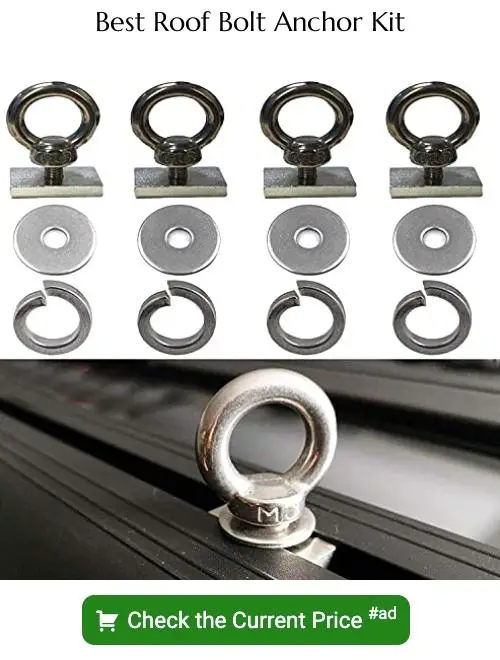Last updated on
Discover the various types of roof bolts and their applications as we delve into the world of robust roofing solutions in this informative blog.
Are you planning to install a new roof or repair an existing one? If yes, then you must be aware of the importance of roof bolts in ensuring the stability and durability of your roof. Roof bolts are essential components that hold the roofing material together and provide support to the structure.
However, with so many types of roof bolts available in the market, it can be overwhelming to choose the right one for your project. In this article, we will discuss different types of roof bolts and their applications to help you make an informed decision.
So, let’s dive in!
Types of Roofing Bolts

Roofing bolts come in different types, each designed for specific roofing applications. The most common types of roofing bolts include:
1. Coach Bolts: These are heavy-duty bolts with a square or hexagonal head and a threaded shank that is partially or fully threaded.
They are ideal for securing timber to metal structures.
2. Hook Bolts: These have an L-shaped hook at one end and a thread on the other end, making them perfect for attaching roof sheets to purlins.
3. Mushroom Head Roofing Bolts: As the name suggests, these have mushroom-shaped heads that provide excellent grip when used with washers on corrugated roofs.
4. J-Bolts: These resemble hooks but have threads along their entire length instead of just at one end like hook bolts do; they’re great for fastening cables and wires securely onto roofs without damaging them.
- 5. Timberlok Screws – Not technically “bolts”, Timberlok screws offer similar benefits as coach bolt while being easier to install due to their self-drilling feature.
- Choosing the right type of roofing bolt depends on various factors such as roof material, load capacity requirements, weather conditions in your area among others.
- In summary:
- Coach Bolt
- Hook Bolt
- Mushroom Head Roofing Bolt
- J-Bolt
- Timberlock Screw
Roof Bolt Materials
The most common roof bolt materials include steel, aluminum, and fiberglass.
Steel roof bolts are the most popular due to their strength and durability. They can withstand heavy loads without breaking or bending.
Steel roof bolts come in different grades depending on their tensile strength.
Aluminum is another material used for making roofing bolts because of its lightweight nature. Aluminum roofing bolts are ideal for use in areas where weight is a concern such as mobile homes or structures with weak foundations.
Fiberglass roofing bolt is an excellent alternative to steel or aluminum if you’re looking for a non-conductive option that won’t rust over time like metal options do. Fiberglass also has high tensile strength but may not be suitable for all types of roofs due to potential compatibility issues with certain coatings.
Roofing Bolt Sizes
The size of the roof bolt you choose will depend on several factors such as the type of roofing material, thickness and pitch of your roof, and local building codes.
Typically, roofing bolts come in different lengths ranging from 1 inch to 6 inches or more. The diameter can also vary depending on the application.
For instance, if you’re installing metal roofs or other heavy-duty materials that require extra support due to their weight or wind resistance requirements then larger diameter bolts may be necessary.
It’s important not only to select appropriate-sized bolts but also ensure they meet safety standards for your area before installation begins. A professional roofer can help determine which size is best suited for your project based on these considerations.
Roof Bolt Installation
The installation process involves drilling holes into the roofing material and securing the bolts with nuts or washers. It’s essential to follow proper installation procedures to ensure that your roof remains secure for years to come.
Before installing any roof bolt, it’s important first to determine its size, length, and spacing requirements based on your specific project needs. Once you have this information, you can begin drilling holes into the roofing material at predetermined intervals using a drill bit that matches the diameter of your chosen bolt.
After drilling all necessary holes in place, insert each bolt through its respective hole from underneath until it protrudes above by about an inch or two. Then add washers followed by nuts onto each protruding end before tightening them down firmly with a wrench.
It’s important not only to install these bolts correctly but also regularly inspect them for signs of wear or damage over time as part of routine maintenance practices.
Advantages and Disadvantages
Understanding these can help you make an informed decision when choosing the right type of bolt for your project.
Advantages:.
1. Durability: Roof bolts are made from high-quality materials that offer excellent durability, ensuring that your roof remains stable for a long time.
2. Versatility: There are different types of roof bolts available in the market to suit various roofing applications such as metal roofs, shingle roofs or flat roofs.
3. Easy Installation: Most types of roof bolts come with easy-to-follow installation instructions making it possible to install them without professional assistance.
Disadvantages:.
- Costly Repairs: If a single bolt fails or becomes loose over time, it can lead to costly repairs if not addressed promptly by professionals.
- Rusting Issues – Some low-quality materials used in manufacturing some types of roofing screws may rust quickly leading to corrosion which weakens the structure over time.
Roof Bolt Maintenance
Regular maintenance can help prevent leaks, rusting, and other issues that may compromise the integrity of your roof. Here are some tips for maintaining your roof bolts:
1. Inspect Your Roof Bolts: Check your roofing bolts periodically for any signs of damage or wear and tear.
2. Tighten Loose Bolts: Over time, the vibration from wind or rain can loosen the nuts on a bolt; therefore it’s important to check them regularly.
3. Replace Damaged Bolts: If you notice any damaged or corroded bolts during inspection replace them immediately with new ones.
4. Clean Debris Around The Roof Area: Remove debris such as leaves around the area where roofing bolt is located so that water does not accumulate in this area causing corrosion over time.
Roof Bolt Safety Considerations
Roofing work can be dangerous, and accidents can happen if proper precautions are not taken. Before starting any roofing project that involves the use of roof bolts, make sure you have the necessary safety equipment such as gloves, goggles or glasses for eye protection and hard hats.
It is also important to ensure that your ladder is secure before climbing up onto the roof. Once on the rooftop, take care when walking around as some areas may be weak or unstable due to damage caused by weather conditions.
Another crucial aspect of ensuring safety during roofing projects involving bolt installation is using appropriate tools for each task. Using incorrect tools could lead to injuries or damage materials being used in construction.
Choosing the Right Roof Bolt
The type of roofing material, the size and pitch of your roof, and the environmental conditions in your area are some of the critical factors that can influence your decision.
For instance, if you have a metal or tile roof with a steep pitch angle, then self-tapping screws or lag bolts may be more suitable than standard roofing nails. On the other hand, if you have an asphalt shingle roof with a low slope angle, then ring-shank nails may be sufficient for securing them.
Another important consideration is selecting high-quality materials for your roofing bolts. Stainless steel and galvanized steel are popular choices due to their durability and resistance against corrosion.
Lastly but not leastly (and this cannot be overstated), always follow manufacturer’s instructions when installing any type of roofing bolt.
Relevant Additional Subheadings From Your List
For instance, “What are Roofing Bolts Used For?” is an important question to ask before choosing a specific type of bolt for your project. This section will explore various applications of roofing bolts and help you understand their importance in different roofing systems.
Another crucial aspect when selecting roof bolts is their price point. The cost can vary depending on factors such as material quality and quantity needed for your project.
Therefore, it’s essential to research “Best Prices on Roofing Bolts” from reputable suppliers or manufacturers.
What Are Roofing Bolts Used For?
They provide a strong and durable connection that can withstand harsh weather conditions, such as high winds and heavy rain. Roofing bolts are commonly used in metal roofing systems, but they can also be used with other types of roofing materials like asphalt shingles or tiles.
The primary purpose of using roof bolts is to ensure that the roof remains stable and secure over time. Without proper fastening, roofs may become loose or even detach from the building during extreme weather events.
Different types of roofing bolts have different applications depending on their size, material composition, and design features. Some common uses for these fasteners include securing ridge caps at the top of a sloped roof or attaching flashing around chimneys or skylights.
Types of Roofing Bolts

The most common types of roofing bolts include:.
1. Coach Bolts: These are heavy-duty bolts with a square or hexagonal head and a threaded shank that is partially or fully threaded.
They are ideal for securing timber to metal structures.
2. Hook Bolts: These have an L-shaped hook at one end and a thread on the other end, making them perfect for attaching roof sheets to purlins.
3. Mushroom Head Roofing Bolts: As the name suggests, these have mushroom-shaped heads that provide excellent grip when used with washers and nuts.
4. Through Bolt Anchors: These are long bolts used to secure heavy items such as air conditioning units onto roofs by drilling through the structure’s surface into concrete below it.
5. Sleeve Anchors: Similar to through bolt anchors but shorter in length; they can be used on lighter loads like satellite dishes or solar panels.
Choosing the right type of roofing bolt depends on several factors such as load capacity, material compatibility, weather resistance among others.
Roofing Bolt Sizes
The size of the roof bolt you choose will depend on several factors such as the type of roofing material, thickness and weight of your roof structure. It is essential to select a suitable size that can provide adequate support for your roof.
Typically, roofing bolts come in different lengths ranging from 1 inch to 12 inches or more. The most common sizes used for residential roofs are between 2-4 inches long with a diameter ranging from ¼ inch up to half an inch.
It’s important not only to consider length but also thread pitch when selecting a roofing bolt size. Thread pitch refers to how many threads per unit length exist on the screw shaft; this determines how tightly it will hold onto materials like wood or metal without stripping out over time due wear-and-tear caused by weather exposure and other environmental factors.
Choosing the right-sized roof bolts is crucial for ensuring proper installation and stability of your new or existing rooftop structure. Be sure always carefully measure before purchasing any hardware so that you get exactly what you need!
Best Prices On Roofing Bolts
However, with some research and careful consideration of your needs, you can find quality roofing bolts at affordable prices. One way to save money is by buying in bulk from reputable suppliers who offer discounts for large orders.
Another option is to compare prices from different retailers and manufacturers before making a purchase.
It’s important not to compromise on quality when looking for the best deals on roofing bolts as using substandard materials could lead to costly repairs or even accidents down the line. Always ensure that you are getting high-quality products that meet industry standards.
While price is an essential factor when purchasing roofing bolts, it should not be the only consideration.
FAQ
What kind of bolts are used in roofing?
Aluminium Roofing Bolts are commonly used in roofing and various DIY projects, featuring a low-profile mushroom style head and a cross-shaped double slot.
What size are roofing bolts?
The most common sizes for roofing bolts are M5, M6, and M8 because they fit the hole sizes of most cable trays and trunking.
What is the load bearing capacity of a roof bolt?
The load bearing capacity of a roof bolt is a minimum of 160 KN.
What is the purpose of a roof bolt?
The purpose of a roof bolt is to aid the rock mass in supporting itself through various support mechanisms depending on the type of roof bolt used.
What are the different materials used for manufacturing roof bolts?
Roof bolts are manufactured using materials such as steel, fiberglass, and stainless steel.
What factors should be considered when selecting the appropriate roof bolts for a specific project?
When selecting the appropriate roof bolts for a specific project, consider factors such as material, length, diameter, load capacity, corrosion resistance, and environmental conditions.
How is the proper installation of roof bolts carried out to ensure safety and structural integrity?
Proper installation of roof bolts is carried out by drilling holes in the roof, inserting roof bolts, and applying tension to ensure safety and structural integrity.





